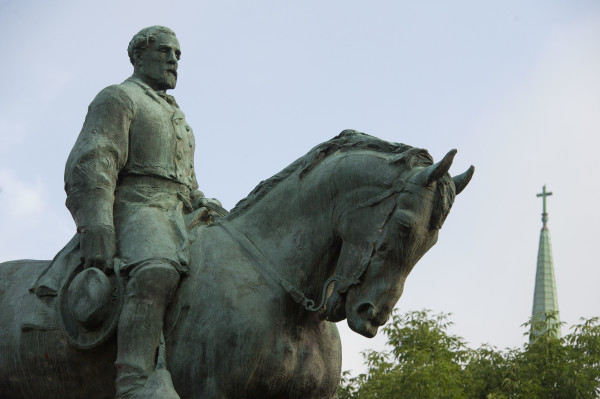

Long a thorn in the U.S. military’s flesh, the longstanding question about why 10 Army bases are named for Confederate commanders blew up over the weekend when Pentagon spokesman Jonathan Hoffman tweeted his outrage over The New York Times’ take on the matter.
During a Pentagon news briefing on Tuesday, Hoffman clarified that he objected to the headline, not the argument the editorial was making.
“Because of the headline where they asserted that 2.3 million men and women in uniform celebrated white supremacy, they failed to jumpstart the conversation they were looking to, which I think is a fair conversation about base naming decisions,” Hoffman told reporters.
On May 23, the editorial “Why Does the U.S. Military Celebrate White Supremacy?” ran on the Times’ website along with an illustration of a bullet in the shape of a Ku Klux Klansman’s hood. The story itself is about bases named for Confederate officers, not service members embracing white supremacy.
“The editorial argues that bases such as Fort Benning, Ga., which is named after a Confederate general who was a vocal proponent of slavery and secession, are an insult to the ideals that American servicemen and women are sworn to uphold,” Kathleen Kingsbury, deputy editorial page editor of The New York Times, said in a statement.
Still, Hoffman tweeted on May 24 that the Times had attacked the U.S. military, which he called “the most diverse meritocracy in the country,” during Memorial Day weekend.
“On a solemn day for remembering those that have given their lives for our country fighting against tyranny and subjugation, the NYT has more than a million possible stories of the ultimate sacrifice by American patriots that they could tell,” Hoffman tweeted. “But they don’t.”
Hoffman’s tweets drew a fair share of criticism. He was accused of defending slave owners. Other critics noted that the Confederacy stood for the exact tyranny and subjugation that the U.S. military has so often opposed; the editorial did not run on Memorial Day itself; and some of the Confederates whom the Army names bases after were poor leaders.

“Military base names should honor American heroes, not traitors who waged a war against the U.S. Army in order to preserve slavery,” Kingsbury said.
Kingsbury said the Times editorial board would be happy to meet with Hoffman to discuss the issue.
The Army began naming bases after Confederate leaders following the United States’ entry into World War I. At the time, President Woodrow Wilson, a Southern Democrat, allowed segregation to flourish in the federal government.
The New York Times pointed out that another of the Army bases in question is named after Maj. General George E. Pickett, who ordered 22 Union prisoners of war to be hanged because they had previously served in the Confederate army.
Hoffman said the Defense Department looked into the issue of military bases named for Confederates, but he was unaware of any recent review of the matter.
In February, an Army spokesman told Task & Purpose that the service had no plans to rename the 10 bases following Marine Corps Commandant Gen. David Berger’s decision to ban all Confederate symbols from Corps installations, including the rebel flag.
“This symbol has shown it has the power to inflame feelings of division,” Berger wrote in an April 20 message to Marines. “I cannot have division inside our Corps.”
